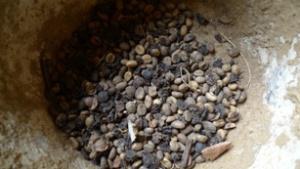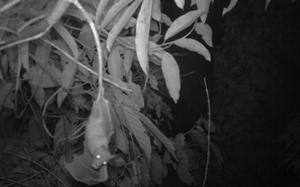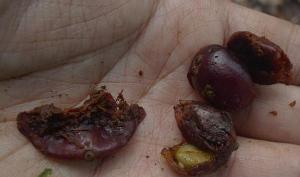Chun Chia Huang
This project aims to reduce farmer-wildlife conflicts by development of a new value-added coffee product, bat-discarded coffee beans, in coffee agricultural area of south-western Sumatra.

Bat-discarded coffee bean from Hay Heni Village in SW Sumatra.
Local farmers can be a key element in biodiversity conservation if they can recognize and profit by the biodiversity associated with their land. Bukit Barisan Selatan National Park in Sumatra, Indonesia, is one of the most biologically diverse areas in the world, but is threatened by increasing encroachment from coffee agriculture. Not only is protected habitat lost, but encroachment also brings farmers into conflict with wildlife. To include farmers as conservation partners, such conflicts need to be resolved, and the economic benefits of biodiversity realized.

Animals may discard seeds when or after they consume fruit. Traditionally, ecologists regard the seed-discarding process as integral to seed dispersal, which indirectly benefits humans by maintaining the recruitment of plant communities in natural ecosystems. In contrast, fruit consumption by animals in agriculture plantations is one of the common conflicts between humans and wildlife in the field of conservation, especially in developing countries. Alternatively, seed-discarding behaviour can also favour people directly by adding value to economic crops. A well-known case is Kopi Luwak (civet coffee), the coffee bean collected from civet guano in the Paleotropics. The bean is highly valued (up to US $1,322 per kg) for its smooth-flavour derived from the internal fermentation in the civets’ digestive system. The price of civet bean (US $16.5 per kg) is about 12-15 times to the price of regular bean (US $ 1.1-1.4 per kg) by local coffee traders. In our pilot study, civet- and bat-discarded beans were found throughout the study site and considered to be better quality than regular beans by local farmers. However, the market potential of animal-discarded beans is not fully exploited in the study area.

This study aims to quantify the economic loss resulting from consumption of coffee berries by wildlife, and explore the potential gains to be had from marketing coffee beans that have been processed by wildlife. I will carry out camera trapping, mist netting, exclusion experiments, and interviews with farmers to evaluate the use of coffee farms by wildlife, the income loss from wildlife’s consumption of coffee berries, farmers’ perception of wildlife, and the potential economic value of wildlife-discarded coffee beans. Our goal is to use the results to reduce human-wildlife conflicts in the study area by development of new value-added coffee products.